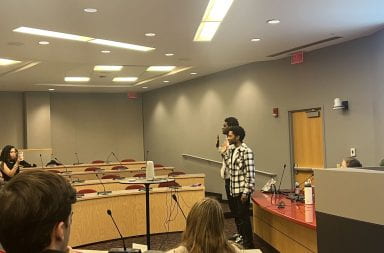Voting for Undergraduate Student Government elections ends Wednesday, but some candidates for the General Assembly said the nature of the election makes it difficult to predict the success of their efforts.
“It’s very stressful — you have no way of knowing,” said Matt Shomo, a second-year in public affairs and a candidate for public affairs senator. “You just have to go out and touch base with as many people as you can and trust that they go out and vote.”
Still, Shomo, who is running on presidential campaign Vytas Aukstuolis and Nick Macek’s slate, said campaigns make attempts at figuring out the results throughout voting, like monitoring how many people access the voting link on their campaign website.
“We know how many people click on that link, but even that doesn’t necessarily translate to votes for us,” he said.
Miranda Onnen, a third-year in political science and economics and a candidate for off-campus senator on presidential campaign Celia Wright and Leah Lacure’s slate, said she tries to use social media to judge the effectiveness of her campaign.
“Tools like social media help give you a quantifiable number of how many people you’re reaching every day, with ‘likes,’ ‘shares’ and ‘retweets,’ but obviously it’s not an exact science,” Onnen said.
Of the current presidential campaigns’ general assembly slates:
- Current USG vice president and presidential candidate Josh Ahart, who is running with Jen Tripi, has the largest slate with 38 people, according to a document posted on the USG website.
- Aukstuolis and Macek have eight people listed on their slate.
- Ryan Hedrick and Nicole Spaetzel have a slate of 16 people.
- Mohamad Mohamad and Sean Crowe have a slate of 10 people.
- Andrew Warnecke and Logan Recker do not have anyone else listed on their slate.
- Wright and Lacure have a slate of 34 people.
While a large slate might help its president and vice president get elected, the same might not be true for its senators.
Candidates are not listed on the ballot by slate, which decreases the likelihood that individual candidates can rely on their slate’s success to put them into the General Assembly.
One of the first years to cease listing candidates by slate was 2009, after the Elections Governance Board reached a consensus that “candidates should be able to run a successful campaign without slate affiliation being identified on the ballot for each voter,” according to a statement from the Elections Governance Board sent in an email from Tyler Byrum, chief justice of the USG judicial panel.
Brennan Barrington, a first-year in aerospace, is one of only two senatorial candidates to run independently of a slate. He said he originally thought being independent would give him a better chance of getting elected — that was, until he found out how steep the competition was this year.
Byrum said last year, there were about 40 candidates for 33 General Assembly seats. This year, there are more than 100 candidates for about 40 seats.
“I thought I’d just run as an independent and I’d have a fairly good chance of winning. The concept of the slate … forces people to follow a party line instead of doing what they themselves think is best. I’ve always liked the ability to use my own judgement and make my own decisions,” Barrington said. “But this year, there are 11 (other) candidates (for 3 engineering seats). Had I known that, I probably would have joined one of the slates.”
When campaigning, Barrington said it can sometimes be difficult to know if his message is resonating with voters.
“I don’t have any Gallup polls, so I don’t have any way to judge that sort of thing,” he said. “The feedback is more immediate when you talk to people face-to-face because they’ll tell you what they think of your ideas, but you don’t get that kind of information from other ways of getting your message out.”
There are six campaign teams running: Ahart and Tripi; Aukstuolis and Macek; Hedrick and Spaetzel; Mohamad and Crowe; Warnecke and Recker; and Wright and Lacure.
Vincent Hayden, a third-year in political science who is running as a social and behavioral sciences candidate on Aukstuolis’ slate, said the campaign has been fun for him and he likes talking with students, but he often comes across people who are disillusioned with USG.
“Some people say they won’t ever vote because they don’t think it does anything. They think it’s all cronyism, and people think it’s just people from the same fraternities and sororities,” he said. “People do have a point about USG being incestuous, but the way to change that is by voting, by getting active and having your voice heard. You should care because part of the money you pay to the university goes to support USG activities.”
Despite the uncertainty of the election, Hayden said it isn’t nerve-wracking for him.
“These things come down to the wire. Anything can happen, so it doesn’t help being nervous about it … because it’s more about the experience. It’s really what ever you make of it,” he said.
Voting ends at 11:59 p.m. Wednesday.
Correction: March 4, 2014
An earlier version of this article misattributed a quote.



